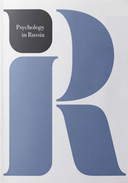Psychology in Russia : state of the art
Abbreviation:
Psychol. Russ.
Published by:
Russian Psychological Society : Faculty of Psychology of Lomonosov Moscow State University
Publisher Location: Moscow, Russian Federation
Journal Website:
https://psychologyinrussia.com/volumes/issues/
Alt: URL:
https://www.ncbi.nlm.nih.gov/pmc/journals/4339/
Range of citations in the SafetyLit database:
2012; --
2023; 16(2)
Publication Date Range:
2008 --
Number of articles from this journal included in the SafetyLit database:
4
(Download all articles from this journal in CSV format.)
pISSN = 2074-6857 | eISSN = 2307-2202
LCCN = 2013252419 | USNLM = 101689922 | OCLC = 840003186
Find a library that holds this journal: http://worldcat.org/issn/20746857
Journal Language(s):
English
Aims and Scope (from publisher):
Established in 2008, the Russian Psychological Society's Journal «Psychology in Russia: State of the Art» publishes original research on all aspects of general psychology including cognitive, clinical, developmental, social, neuropsychology, psychophysiology, psychology of labor and ergonomics, and methodology of psychological science.
Journal's list of authors comprises prominent scientists, practitioners and experts from leading Russian universities, research institutions, state ministries and private practice. Addressing current challenges of psychology, it also reviews developments in novel areas such as security, sport, and art psychology, as well as psychology of negotiations, cyberspace and virtual reality.
The journal builds upon theoretical foundations laid by the works of Vygotsky, Luria and other Russian scientists whose works contributed to shaping the psychological science worldwide, and welcomes international submissions which make major contributions across the range of psychology, especially appreciating the ones conducted in the paradigm of the Russian psychological tradition.
It enjoys a wide international readership and features reports of empirical studies and theoretical contributions, which aim to further our understanding of psychology.
